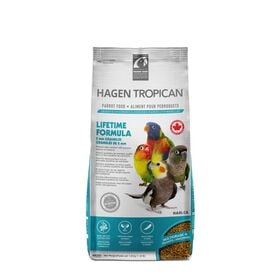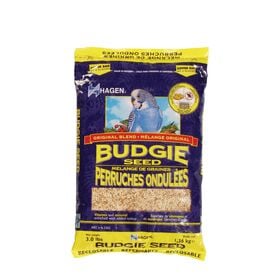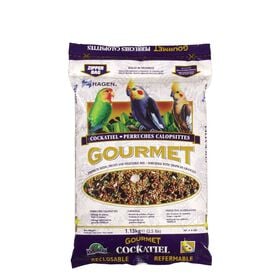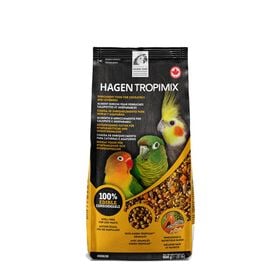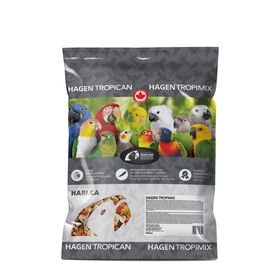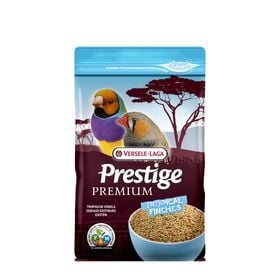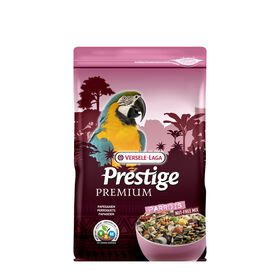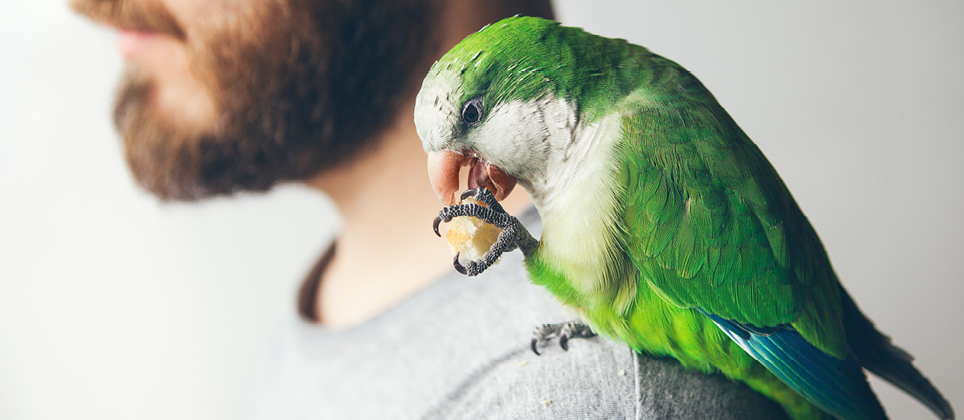
A healthy parrot diet
Published April 7, 2018.
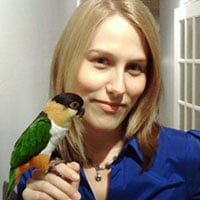
Dre Sophie Hébert, veterinarian for birds and exotic animal
CABEA member
A nutritious diet is key to good health, which is why it is one of our most popular topics. A poor diet is a predisposing factor for a large percentage of health problems in birds.
One persistent myth is that birds eat seeds. Although seeds are part of their natural diet, for most species, dry seeds are available only for a short period during the year and in limited quantities.
Most parrots are naturally omnivores: they eat flowers, fruit, nuts, buds, seeds and insects. They also spend an enormous amount of energy flying several kilometres a day, which is not the case for our pet birds.
How can you ensure a healthy diet for birds in captivity when their energy requirements are significantly reduced and you are unable to offer them the same foods that they would have access to in nature? The key is a varied diet. But be careful: many people offer such a wide variety of food that birds end up sorting through and eating only their favourite things, not eating a balanced diet and consuming too many calories. The solution: offer a limited number of high-quality items, which will allow birds to make healthy choices easily.
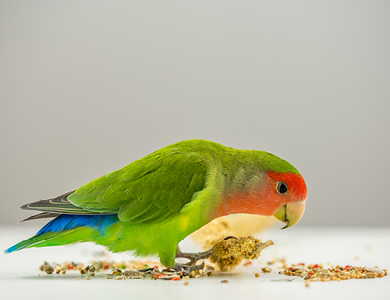
Pellets
- High-quality pellets are the most important element of a bird’s base diet.
- Pellets are formulated to provide a complete diet, with added essential vitamins and minerals. In addition, they prevent birds from sorting through and eating only the fattier foods (as is the case with a seed mix).
- Pellets can be adapted to a bird’s lifestyle and meet its particular needs (e.g., growth, reproduction, maintenance, geriatric stage).
- Pellets are available in various forms: extruded, granules, blocks, spheres, etc. Some may be more appetizing or attractive to certain birds and can offer variety. The pellet size should be adapted to the size of the bird.
- Choose quality pellets from a well-known company that researches its products. Avoid artificial dyes and pellets mixed with grains, nuts or dried fruit. They can easily become rancid, and it can be difficult to control the proportion that a bird receives.
Grains
- Select a mixture of quality grains. They should be clean, dry and have a pleasant odour.
- Choose mixtures that do not contain sunflower seeds. Since these seeds are high in fat, birds will often choose them over others.
- Be sure that the mixture contains at least five or six different types of grains whose size is suited to your bird.
- Avoid mixtures that also contain nuts or dried fruit. They can easily become rancid, and it can be difficult to control the proportion that a bird receives.
Vegetables
- Offer a variety of fresh vegetables daily.
- Choose green (e.g., broccoli, green beans, spinach) and dark orange (e.g., squash, sweet potato, carrots, peppers) vegetables instead of pale vegetables, which are much less nutritious.
- Try offering them in stick form, grated, pureed, sliced or slightly cooked in order to determine what your bird likes best. Varying the presentation can help motivate a picky eater.
- Choose leafy green vegetables (e.g., romaine lettuce, kale, spinach) for small birds, since they are generally more likely to eat these foods.
- Keep in mind that avocado, garlic and onions (and foods from the same family) are highly toxic! Also avoid tomato leaves, raw potato, and fruit pits and seeds.
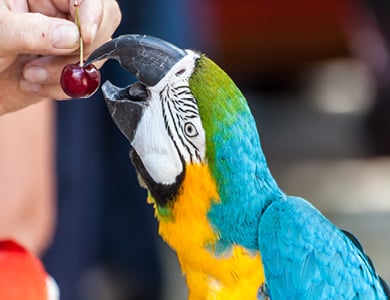
Fruit
- Fruit should be considered more of a treat than an essential part of a bird’s diet.
- Since fruit is high in sugar, quantities should be very limited.
- For a bird the size of a cockatiel, one grape is equivalent to 365 grapes for a human. Keep this in mind when preparing daily rations.
- Choose colourful fruit, such as mango, papaya, cantaloupe or berries (e.g., raspberries, strawberries, blueberries).
Nuts
- Very useful for positive reinforcement.
- Offer very small amounts, since they are high in calories. Avoid salted nuts altogether.
- Use only human-grade nuts. Poorer quality nuts can contain toxins produced by certain moulds (aflatoxins), which can cause severe liver damage in parrots. Avoid peanuts in the shell for the same reason.
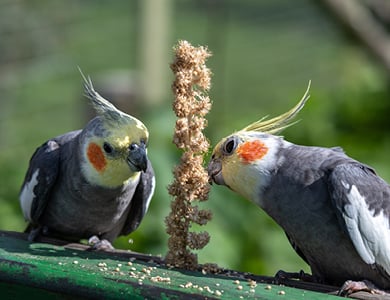
Treats
- Choose nuts, seeds or fruit in small quantities.
- Avoid commercial treats such as honey sticks, which are much too sweet.
Table scraps
- Some healthy table scraps can be given in limited quantities. No specific table scraps are a requisite part of a bird’s diet.
- Pay attention to the quantities. If you give your bird too many table scraps, it won’t be hungry enough to eat its healthy food. Avoid foods high in fat, sugar or salt.
- Cooked grains (e.g., rice, quinoa), legumes, pasta and bread (ideally whole-grain varieties) can be given occasionally.
- Animal proteins (e.g., fully cooked meat, chicken, fish, fully cooked eggs) should be given no more than once or twice a week.
- Keep in mind that birds do not produce enzymes that allow them to digest lactose. Low-lactose dairy products (e.g., unsweetened yogurt, hard cheeses) can be given occasionally.
- Tea, coffee and chocolate are toxic, as they are for other animals.
For small parrots (e.g., budgies, lovebirds, cockatiels):
- 50% high-quality pellets
- 25%-40% grain mixture
- 10%-25% vegetables
- 0%-5% fruit
Approximately half grain/half pellets, with some fresh vegetables daily.
For larger parrots (e.g., conures, caiques, Amazons, cockatoos):
- 60%-75% high-quality pellets
- 0%-25% grain mixture
- 15%-25% vegetables
- 0%-5% fruit, treats, healthy table scraps
- 0%-5% human-grade nuts
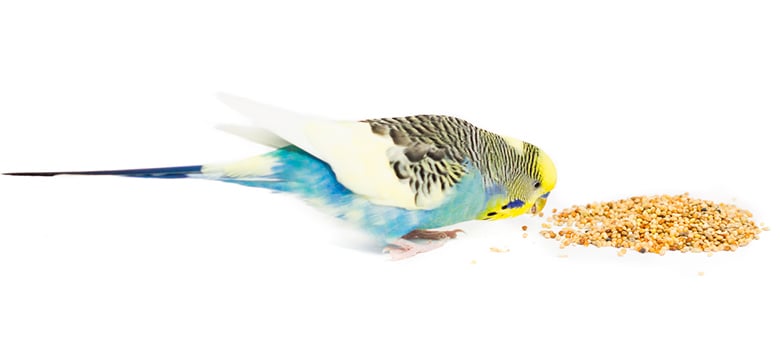
Mainly pellets with fresh vegetables daily, as well as grains, nuts and occasionally other items.
